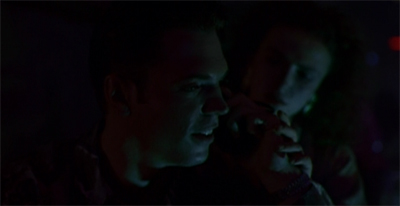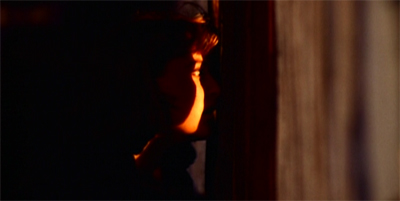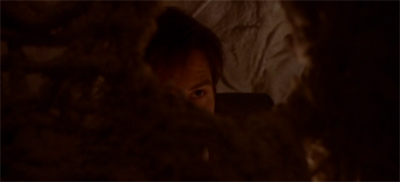Gender Bender is weird. As an atmospheric moody piece of television, it’s pretty phenomenal – the script manages to tap into a whole bunch of basic nineties fears and uncertainties, while director Rob Bowman layers on the sense that something is not quite right here. On the other hand, as a narrative, the episode comes up short. From the cop-out ending to the laziness of putting Scully in peril twice, the story for Gender Bender is nowhere near as tight as it needs to be.
And yet, despite that, there’s a pervading sense of dread and unease that makes it far more compelling than it should be.
Gender Bender is the first episode directed by Rob Bowman. The director would go on to become one of the show’s most prolific and impressive directorial talents. It was Rob Bowman who directed X-Files: Fight the Future, and did a pretty wonderful job of it. Bowman was also among the group of directors working on the show who really pushed the film’s aesthetic towards the cinematic – framing shots in such a way that the show often felt more like a slick film than a weekly television show.
Indeed, the show gracefully made the transition from the standard televised 4:3 aspect ratio to widescreen in its fifth season, one of the reasons I’m probably fonder of that season than I really should be. However, even the early seasons were shot with an eye to that more cinematic of formats. According to cinematography John Bartley, the show was “protected” for widescreen. I’d love to see the inevitable blu ray releases offer these widescreen versions of the early seasons, even if it seems highly unlikely.
Still, Bowman’s direction is one of the reasons that Gender Bender works as well as he does. The episode’s ending – what if the Amish were space!Amish? – is a massive cop-out, and a neat way to close out the story as it runs out of airtime. However, Bowman gives Mulder and Scully’s exploration of the compound a rather grand and sweeping feel. In particular, Mulder’s exploration of the barn is stunningly shot, the camera gracefully swinging around to follow his investigation.
That last shot of the duo standing in a crop circle feels more powerful and vivid than it really should, giving the loose ending a weight that the episode hasn’t really earned. On a purely technical level, Gender Bender is an absolutely wonderful accomplishment. In particular, Mark Snow’s score is beautifully ominous, including rather unnerving ram’s horns to help lend the whole thing a decidedly unearthly feel. Coupled with Bowman’s decision to shoot the Kindred compound like American Gothic, it creates a pretty heavy and foreboding atmosphere.
To be fair to writers Larry and Paul Barber, their mess of a script contains a rake of fascinating ideas – even if it’s never entirely sure what to do with those ideas. Gender Bender doesn’t really work as a story, but it’s infinitely fascinating as a collection of nineties anxieties. From the opening scene in the rave club, Gender Bender feels very much of its time – an artifact of the early nineties, a capsule containing a whole host of uncertainties and insecurities.
As we noted in discussing Ice, this was at the height of the AIDs crisis. Although the illness had first been named in 1981, it firmly embedded itself in the public consciousness in the late eighties and nineties. While there had been a number of high-profile media reports and case studies on the disease in the mid-eighties, it really pushed itself to the front of the American popular consciousness in the nineties.
Of the 100,777 deaths related to the disease reported between 1981 and 1990, almost one third (31,196) were reported in 1990. In response to the death of Ryan White in 1990, the United States government passed the CARE act. Earvin ‘Magic’ Johnson’s admission that he had contracted the disease in 1991 did a lot to raise the profile of the illness among the public and to combat preconceptions and stereotypes.
The month that Gender Bender aired, the government had provoked a minor controversy by running some high profile television advertisements encouraging safe sex. Exactly two months after Gender Bender was broadcast, Philadelphia won Tom Hanks his first Academy Award for portraying a man battling AIDs while fighting his former employer in a wrongful termination suit. AIDs was very much at the front of public consciousness, meaning that it was the perfect time to make sex scary.
The episode even has some effective parallels with popular “AIDs Mary” urban legends at the time (with the wonderful Snopes.com dating the myth to the same year Gender Bender aired), with people discovering that the best sex of their lives (and the first victim is uncomfortably effusive about that) came with some pretty significant strings attached. Of course, the death of the killer’s sexual partners is a lot more immediate, but it’s a much more effective visual.
That said, I’m not quite sure what to make of the whole “isn’t it freaky that the creature can change genders?” reveal – particularly since it’s often framed in the immediate aftermath of sex and used as a shocking twist reveal. It seems disturbingly like one of those “that girl is really a guy” homophobic – or transphobic – urban legends. Indeed, it seems to evoke all those “trans panic” defenses used when heterosexual men assault transgendered women.
It’s a nice visual for the episode, and an effective close for the teaser, but it isn’t as though Gender Bender isn’t overloaded with effective horror ideas. Our villain changes gender in the teaser, but only after watching her/his sexual partner violently die in bed immediately following some super-sensual love-making. Actually having the character change gender seems a little bit like overkill. Surely the sex-related deaths alone would have been enough to catch Mulder’s attention?
The uncomfortable subtext is only increased with the emphasis on the killer’s male victims. The killer is an equal-opportunity offender, but only his/her male victims get focus – the first one gets quite a few lines, and the second gets to be a survivor who freaks out using a transformation. Actor Nicholas Lea argues that watching your sexual partner literally change genders right in front of you is distinct from homophobia or transphobia, and he has a point. Still, it can’t help but feel unsettling – in the wrong way.
(That said, Rob Bowman does deserve credit for that wonderful opening shot, juxtaposing the gender-switching killer with nightclub artwork very clearly modeled on the work of H.R. Giger, the master of the whole “sex that is going to kill you” subgenre – the man responsible for the design of the creature from Alien. It’s rich and vivid, and unsettling, and thus plays to the strengths of the episode.)
Gender Bender also manages to hit on the moral panic surrounding the club and rave scene in the eighties and nineties. Law enforcement were responsible for drug-related clampdowns on the scene what has been sarcastically dubbed “the war on raves.” Although the page has since been reshuffled, the Drug Free America Foundation once had an entire section of its family guide devoted to “raves.”
The show’s resident skeptic, Scully gets to be the voice of moral concern, articulating these very nineties fears all wrapped up inside Gender Bender. Examining on of the victims, Scully idly muses, “Hard to imagine in this day and age someone having sex with a perfect stranger.” While investigating the murders and looking for a rational explanation, Scully is quick to draw on the popular association of the rave scene with drug usage. “You think there’s a new drug on the streets?” she asks.
Indeed, Gender Bender occasionally feels a little too moralistic for its own good. It turns out that a few discarded magazines are enough to turn the space!Amish into depraved sex monsters. Sure, our killer is the only one affected, but his best friend is corrupted enough to try to make a move on Scully. Earlier, Scully pointed to the fact that they had “victims of both sexes” as evidence that the killer could be male or female – as if victims of a single sex would allow them a more definitive identification. Apparently alien shape-shifters are easier to accept than bisexuals or homosexuals.
Still, Gender Bender has one more trick up its sleeve, and it’s a nice one. The X-Files has spent quite a lot of its first season exploring the landscape of post-Cold War America, probing the suburbs in Eve and suggesting a new Cold War in Fallen Angel. It’s a show that has spent a lot of time exploring the consequences of past atrocities – in Squeeze, Tombs was the embodiment of the darker side of city living, while Ghost in the Machine and Fallen Angel were fixated on the legacy of the Second World War.
As much as The X-Files is a show about how the past defines the present, it also serves as something of an exploration of a version of America that is slowly fading from view and receding into America, a strange and surreal world where the darkness is being fought further and further back by encroaching globalisation. Street lamps, GPS and mobile phones do a lot to push back the shadows. This almost nostalgic paean for lost horrors would come to the fore in later seasons – episodes like Home and Detour and Bad Blood and Post-Modern Prometheus.
And this is the first real sense we’ve got of an old order fading away, with a bunch of pseudo-Amish living in an isolated idealised community who literally disappear off the face of the Earth at the end of the episode. The Kindred seems like relics from some old folklore dating back to the turn of the century, a group of people locking themselves off from the world – the subject of all sort of superstition and gossip and rumour.
The Kindred are a historical curiousity. When Mulder inquires about their secretive ways, a local business owner explains, “Yeah, some folks say it’s because they’re doing ceremonies up there. Voodoo or something. I’ve got nothing against them, myself. They bring in the tourists.” The Kindred are a morbid curiosity, like that old haunted house at the end of the road, or that strange old man wandering about time. They’re a local mystery, an urban legend, something that has been brushed aside as technology pushes forward and the world becomes smaller. Even Scully is curious about them.
The Kindred are not of our world. “We’re all saddened by what has happened in your world, but it does not concern us,” Sister Abby assures Mulder and Scully, suggesting that even when they are on the same planet they belong to another time and place. At dinner, Brother Wilton insists that they must stand apart from the mundane modern world. “Your world does not interest us,” he insists. “We have no need for your violence or your questions.”
At the end, the Kindred are just gone. It is, on any narrative level, a massive cop-out. It’s a cheat, a nice way to wrap up the episode without any real explanation or conclusion. However, it also feels strangely appropriate. A lot of this is down to Rob Bowman’s direction, but it’s also because it feels like we are watching phantoms vanish into history. Or, perhaps, myths and legends transfiguring before our eyes. Those strange outsiders on the edge of town are an outdated myth for the modern world. Instead, they become aliens, something more modern – something more mundane and relatable to the modern world.
That said, there is a rather creepy subtext to the whole thing, something that has only grown more unsettling in hindsight. The killer seems terrified at the inevitability of his/her religious brethren hunting him/her down. “They’ll find me, because the day is coming and they won’t leave without me.” It sounds almost like a cult waiting for some form of extraterrestrial transubstantiation. The belief that fringe religious groups would find life among the stars was popular during the nineties.
The same year that Gender Bender aired, the Solar Temple began a series of mass suicides – with many victims believing they were going to a better life on “Sirius”, the brightest star in the night sky. The most famous case would come three years later, when Heaven’s Gate committed a mass suicide in the belief that the members would be “picked up” by an alien space ship travelling behind the Hale-Bopp comet.
As such, the Kindred seem to meld a more classic local legend (the creepy weirdos on the edge of town) with a more modern mythology (aliens) to create something mirroring a popular concern of the time. That’s quite an accomplishment, and something that makes Gender Bender quite a fascinating watch. It’s a well-directed episode, with a whole blender full of fascinating idea all mushed together to form something so strange and surreal that really has to be watched.
That said, the script is never as strong as the best of its ideas. On top of all the unsettling moralistic philosophy, the lack of story structure and the faint hints of transphobia, it feels like the episode never really knows where it is going. It also falls back on the awkward story crutch of putting Scully in danger to raise the stakes, as Scully finds herself unable to resist sexy alien pheromones. Mulder has to race to her rescue, which feels like it diminishes her as a character.
Scully is arguably the better-guarded of the pair, the most grounded and the most sceptical. Reducing her to a damsel in distress is extremely frustrating, despite Gillian Anderson’s best efforts with the material given to her. The fact that the episode repeats the plot point at the climax feels a little lazy. I have no problem making Scully vulnerable – I love Beyond the Sea – but it seems trite to treat her as somebody who needs Mulder to look out for her, when the bulk of the series points in the other direction.
Gender Bender isn’t a great episode. I’m not even sure it’s a good one. But it is a fascinating watch.
You might be interested in our other reviews of the first season of The X-Files:
- The Pilot
- Deep Throat
- Squeeze
- Conduit
- The Jersey Devil
- Shadows
- Ghost in the Machine
- Ice
- Space
- Fallen Angel
- Eve
- Fire
- Beyond the Sea
- Gender Bender
- Lazarus
- Young at Heart
- E.B.E.
- Miracle Man
- Shapes
- Darkness Falls
- Tooms
- Born Again
- Roland
- The Erlenmeyer Flask
Filed under: The X-Files | Tagged: Alejandro Jodorowsky, alien, Bender, Bowman, Dana Scully, Frank Herbert, Gender bender, H.R. Giger, John Bartley, Kindred, Mark Snow, Michel Seydoux, Nicholas Lea, Pez, Rob Bowman, Ryan White, sexuality, tom hanks, X-File |


































My favorite episode of all time is Home. It is just so bizarre about their family structure. I would love to psychoanalyze them, get into their heads. Can I make a request unless you go by a blogging schedule? I would love to hear your opinion/review on it if you would please? Thanks 🙂
Alas, I am doing the first season this year. Depending on the response to it, I may come back and do the second season next year. I’d love to progress through it linearly, and cover the spin-offs and related shows as I go. (Space: Above and Beyond against three, Millennium against four/five/six, The Lone Gunmen against eight, Harsh Realm… somewhere.)
But I do love Home. I’d argue it’s a clear descendent of the Amish stuff in Gender Bender, a story about how America is kind of morphing from these disparate individual communities with their own mythologies into one larger body with its own grand sweeping myths. It’s telling how so many of these stories (like Home, Gender Bender or Bad Blood) end with the freak retreating into the night – their home destroyed, and a sense that they are looking for other shadows to lurk in. (I’d argue it’s also part of Tooms at the end of the season, where Tooms old hiding-hole is demolished so that a mall can be built on top of it. His hideaway becomes the instrument of his destruction.)
Millennium was great. Who doesn’t love Lance Henriksen? And the Lone Gunman was pretty awesome too. It was a shame when the plug was pulled on both shows. Ah, yes, Tooms, what a shame that was. I personally, myself, and I cannot speak for others, have enjoyed and looked forward to your posts about the X-Files. I cannot speak for other people. I was very surprised when you start reviewing them because I had been used to reading your movie reviews and see that you do Star Trek reviews(plz not that I am NOT a Star Trek fan LOL). But I like it. I think it kool and it is a break from the ordinary. A different, fresh perspective on an epic tv show. It is nice to have someone explain about the episode because I didn’t know at the time and still may not know what it was really all about. I have liked all your posts and though I don’t comment much or even at all. I still like and appreciate your posts. Thank you 🙂
And thank you for your kind words! I’m doing the X-Files through the end of the month at any rate.
The atmosphere and cinematography on this one is excellent; lots of deep blacks, cloudy skies, dew-wet grass, great shot selection and compositions. You know right away it’s a Rob Bowman episode.
Yep, it’s one of the best looking episodes of the first season.
This is one that definitely doesn’t play all that well, but God damn can Rob Bowman direct. I’m trying to think if there’s ever been a director who’s had a better opening shot for their first episode? That visual of the eye is immediately arresting, while also being very X-Files.
As you say, the whole “the killer can change gender!” thing feels very dated. While it doesn’t feel quite as malicious, it’s still hard not to link it in my mind to the uncomfortable running thread of ’90s comedies insisting that trans people are inherently ridiculous or funny, or indeed the whole “trans panic” rhetoric.
(I mean not to put too fine a point on it, but if you swapped this episode in the running order with Lazarus it would have been aired on the same day as Ace Ventura: Pet Detective hit theatres…)
But more than that it’s hard to watch this nowadays in an era where the right are determined to push a narrative of trans people as some evil, deviant, predatory force and not feel very uncomfortable. Again, I doubt it was conscious, but…
Ah well. Still better than a fair chunk of the episodes coming up, but I guess that’s more an indictment of them than an endorsement of this one.